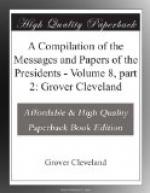If it be true that the noblest treaty of peace ever mentioned in history is that by which the Carthagenians were bound to abolish the practice of sacrificing their own children because it was stipulated in favor of human nature. I can not exaggerate to myself the unfading glory with which these United States will go forth in the memory of future ages if by their friendly counsel, by their moral influence, by the power of argument and persuasion alone they can prevail upon the American nations at Panama to stipulate by general agreement among themselves, and so far as any of them may be concerned, the perpetual abolition of private war upon the ocean. And if we can not yet flatter ourselves that this may be accomplished, as advances toward it the establishment of the principle that the friendly flag shall cover the cargo, the curtailment of contraband of war, and the proscription of fictitious paper blockades— engagements which we may reasonably hope will not prove impracticable— will, if successfully inculcated, redound proportionally to our honor and drain the fountain of many a future sanguinary war.
The late President of the United States, in his message to Congress of the 2d December, 1823, while announcing the negotiation then pending with Russia, relating to the northwest coast of this continent, observed that the occasion of the discussions to which that incident had given rise had been taken for asserting as a principle in which the rights and interests of the United States were involved that the American continents, by the free and independent condition which they had assumed and maintained, were thenceforward not to be considered as subjects for future colonization by any European power. The principle had first been assumed in that negotiation with Russia. It rested upon a course of reasoning equally simple and conclusive. With the exception of the existing European colonies, which it was in nowise intended to disturb, the two continents consisted of several sovereign and independent nations, whose territories covered their whole surface. By this their independent condition the United States enjoyed the right of commercial intercourse with every part of their possessions. To attempt the establishment of a colony in those possessions would be to usurp to the exclusion of




